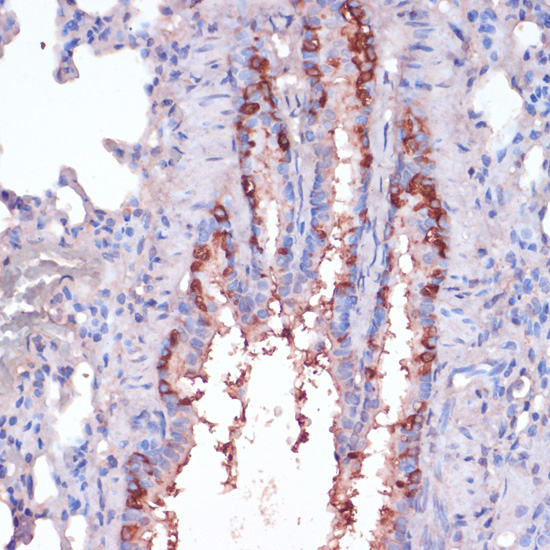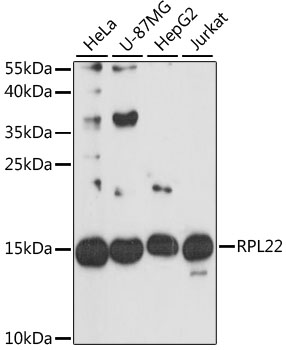Product Detail
Product NameRPL22 Rabbit Polyclonal Antibody
Host SpeciesRabbit
ClonalityPolyclonal
IsotypeIgG
PurificationAffinity purification
ApplicationsWB,IHC,IF
Species ReactivityHuman,Mouse,Rat
Immunogen DescRecombinant fusion protein of human RPL22 (NP_000974.1).
ConjugateUnconjugated
Other NamesRPL22;EAP;HBP15;HBP15/L22;L22
Accession NoSwiss Prot:P35268
GeneID:6146
Uniprot
P35268
Calculated MW14kDa
Sdspage MW15kDa
FormulationBuffer: PBS with 0.02% sodium azide,50% glycerol,pH7.3.
StorageStore at -20˚C. Avoid freeze / thaw cycles.
Application Details
WB 1:500 - 1:2000
IHC 1:50 - 1:100
IF 1:50 - 1:100
Immunohistochemistry of paraffin-embedded rat lung using RPL22 at dilution of 1:100 (40x lens).
Western blot analysis of extracts of various cell lines, using RPL22 at 1:3000 dilution.
Ribosomes, the organelles that catalyze protein synthesis, consist of a small 40S subunit and a large 60S subunit. Together these subunits are composed of 4 RNA species and approximately 80 structurally distinct proteins. This gene encodes a cytoplasmic ribosomal protein that is a component of the 60S subunit. The protein belongs to the L22E family of ribosomal proteins. Its initiating methionine residue is post-translationally removed. The protein can bind specifically to Epstein-Barr virus-encoded RNAs (EBERs) 1 and 2. The mouse protein has been shown to be capable of binding to heparin. Transcript variants utilizing alternative polyA signals exist. As is typical for genes encoding ribosomal proteins, there are multiple processed pseudogenes of this gene dispersed through the genome. It was previously thought that this gene mapped to 3q26 and that it was fused to the acute myeloid leukemia 1 (AML1) gene located at 21q22 in some therapy-related myelodysplastic syndrome patients with 3;21 translocations; however, these fusions actually involve a ribosomal protein L22 pseudogene located at 3q26, and this gene actually maps to 1p36.3-p36.2.
If you have published an article using product 55589, please notify us so that we can cite your literature.




 Yes
Yes



